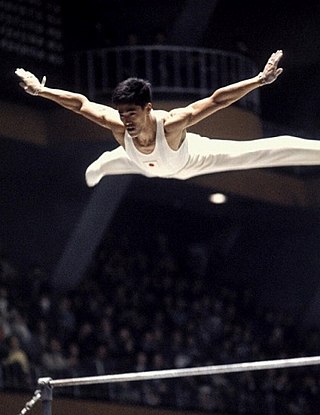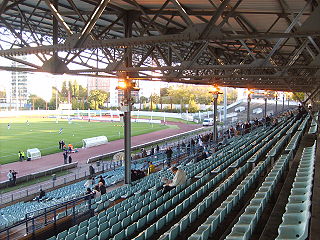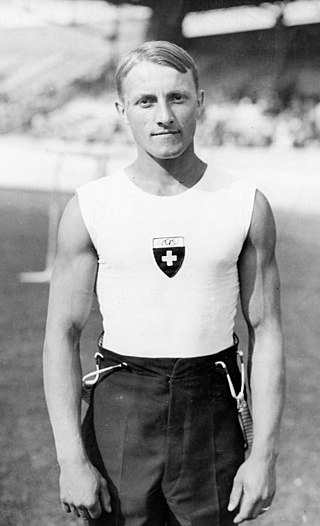
At the 1900 Summer Olympics one gymnastics event for men was contested. The competition was held on Sunday, 29 July 1900, and on Monday, 30 July 1900. There were 135 competitors from 8 nations. The top 18 places were taken by French gymnasts, of which there were more than 100. The event was won by Gustave Sandras, with Noël Bas finishing second and Lucien Démanet third. The highest-placing foreign gymnast was Jules Ducret of Switzerland, in a tie for 19th place.

The men's individual all-around, also known as the heptathlon, was one of two gymnastics events on the Gymnastics at the 1908 Summer Olympics programme. As suggested by the alternate name, the competition included seven events with the scores summed to give a final score. Each nation could enter up to 20 gymnasts, with France and Great Britain each entering the maximum. A total of 97 gymnasts from 12 nations competed. The event was won by Alberto Braglia of Italy, the nation's first medal in the men's individual all-around. Silver went to Walter Tysall of Great Britain, the first medal for the nation as well. France's Louis Ségura earned bronze.

The men's parallel bars was a gymnastics event contested as part of the Gymnastics at the 1964 Summer Olympics programme at the Tokyo Metropolitan Gymnasium. The event was held on 18, 20, and 23 October. There were 128 competitors from 29 nations, with nations in the team competition having up to 6 gymnasts and other nations entering up to 3 gymnasts. The event was won by Yukio Endo of Japan, the nation's first victory in the parallel bars after two Games with silver and bronze medals. It was the first of a four-Games gold medal streak for Japanese gymnasts in the event. Japan also took silver, with Shuji Tsurumi finishing second. Bronze went to Franco Menichelli of Italy.

The men's horizontal bar was an artistic gymnastics event held as part of the gymnastics programme at the 1904 Summer Olympics. It was the second time the event was held at the Olympics. An unknown number of gymnasts competed, only five are known at present. The competition was held on Friday, October 28, 1904. Anton Heida and Edward Hennig tied for first, with George Eyser third.

The men's vault was an artistic gymnastics event held as part of the gymnastics programme at the 1904 Summer Olympics. It was only the second time that the event was held at the Olympics. An unknown number of gymnasts competed, only five are known. The competition was held on Friday, October 28, 1904.

The men's pommel horse was an artistic gymnastics event held as part of the gymnastics programme at the 1904 Summer Olympics. It was the second time the event was held at the Olympics. An unknown number of gymnasts competed, only five are known. The competition was held on Friday, October 28, 1904. All known competitors were American. The event was won by Anton Heida, with George Eyser second and William Merz third.
The men's combined was an artistic gymnastics event held as part of the gymnastics programme at the 1904 Summer Olympics, and was held on Friday, October 28. 1904 was the second time a combined apparatus event was held at the Olympics, though the previous incarnation was more similar to the all-around turnverein which took place in July. The format of the combined, however, was the basis for later all-around type events.

The men's rings was an artistic gymnastics event held as part of the gymnastics programme at the 1904 Summer Olympics. It was the second time the event was held at the Olympics. An unknown number of gymnasts competed, only three are known. The competition was held on Friday, October 28, 1904. All three of the known competitors, the medalists, were American. The event was won by Herman Glass, with William Merz second and Emil Voigt third.
The men's triathlon was an artistic gymnastics event held as part of the gymnastics programme at the 1904 Summer Olympics. It was the only time the event was held at the Olympics. The competition was held on Friday, July 1, 1904, and on Saturday, July 2, 1904. One hundred and nineteen gymnasts from three nations competed.

The men's artistic individual all-around was an artistic gymnastics event held as part of the gymnastics programme at the 1904 Summer Olympics. It was the second time an all-around event was held at the Olympics. The competition was held on Friday, July 1, 1904 and on Saturday, July 2, 1904. One hundred and nineteen gymnasts from three nations competed. The event was won by Julius Lenhart, an Austrian gymnast living in the United States and competing under the auspices of his Philadelphia-based club. Silver went to Wilhelm Weber of Germany, with bronze to Adolf Spinnler of Switzerland. They were the first medals in the event for each of those nations, as France had swept the medals in 1900.

The men's parallel bars event was part of the gymnastics programme at the 1924 Summer Olympics. It was one of nine gymnastics events and it was contested for the third time after 1896 and 1904. The competition was held on Sunday, July 20, 1924. Seventy-two gymnasts from nine nations competed. The event was won by August Güttinger of Switzerland, the nation's first victory in the event. Robert Pražák of Czechoslovakia and Giorgio Zampori of Italy earned silver and bronze, respectively.

The men's horizontal bar event was part of the gymnastics programme at the 1924 Summer Olympics. It was one of nine gymnastics events and it was contested for the third time after 1896 and 1904. The competition was held on Saturday, July 19, 1924. Seventy-two gymnasts from nine nations competed. The event was won by Leon Štukelj of Yugoslavia, with Jean Gutweninger of Switzerland taking silver and André Higelin of France bronze. It was the first medal in the horizontal bar for each of those nations.

The men's parallel bars event was part of the gymnastics programme at the 1928 Summer Olympics. It was one of seven gymnastics events for men and it was contested for the fourth time after 1896, 1904, and 1924. The competition was held on Thursday, August 9, 1928. Eighty-five gymnasts from eleven nations competed, with each nation having a team of up to 8 gymnasts. The event was won by Ladislav Vácha of Czechoslovakia, the nation's first victory in the men's parallel bars. The silver medal went to Josip Primožič of Yugoslavia, with Hermann Hänggi of Switzerland earning bronze.

The men's parallel bars event was part of the gymnastics programme at the 1932 Summer Olympics. It was contested for the fifth time after 1896, 1904, 1924, and 1928. The competition was held on Friday, August 12, 1932. Fifteen gymnasts from six nations competed. Each nation was limited to three gymnasts. The event was won by Romeo Neri of Italy, the nation's first victory in the men's parallel bars. István Pelle earned Hungary's first medal in the event with his silver, while Heikki Savolainen similarly earned Finland's first medal with his bronze.

The men's horizontal bar event was part of the gymnastics programme at the 1932 Summer Olympics. It was contested for the fifth time after 1896, 1904, 1924, and 1928. The competition was held on Thursday, August 11, 1932. Twelve gymnasts from six nations competed. Each nation was limited to three gymnasts. The event was won by Dallas Bixler of the United States, the nation's first victory in the men's horizontal bar since 1904 and second overall. Heikki Savolainen and Einari Teräsvirta of Finland tied for second; the two agreed that Savolainen would take silver and Teräsvirta bronze. They were the first medals for Finland in the horizontal bar.

The men's parallel bars competition was one of eight events for male competitors in artistic gymnastics at the 1984 Summer Olympics in Los Angeles. The qualification and final rounds took place on July 29, 31 and August 4 at UCLA’s Pauley Pavilion. There were 71 competitors from 19 nations, with nations competing in the team event having 6 gymnasts while other nations could have to up to 3 gymnasts. The event was won by Bart Conner of the United States, the nation's first victory in the parallel bars since 1904 and second overall. Another American, Mitch Gaylord, took bronze. Japan returned to the podium after the 1980 boycott broke its six-Games medal streak, with Nobuyuki Kajitani's silver.

The men's parallel bars competition was one of eight events for male competitors in artistic gymnastics at the 1968 Summer Olympics in Mexico City. There were 117 competitors from 28 nations, with nations in the team competition having up to 6 gymnasts and other nations entering up to 3 gymnasts. The event was won by Akinori Nakayama of Japan, the nation's second consecutive victory in the parallel bars event, tying Germany and the Soviet Union for second-most all-time behind Switzerland at three gold medals. It was the second of four straight Games that the parallel bars would be won by a Japanese gymnast. Mikhail Voronin took silver and Viktor Klimenko took bronze to put the Soviet Union back on the podium after a one-Games absence.

The men's parallel bars competition was one of eight events for male competitors in artistic gymnastics at the 1956 Summer Olympics in Melbourne. It was held from 3 to 7 December at the Melbourne Festival Hall. There were 63 competitors from 18 nations, with nations in the team competition having up to 6 gymnasts and other nations entering up to 3 gymnasts. The event was won by Viktor Chukarin of the Soviet Union, the nation's first victory in the parallel bars. Japan took three medals: a silver by Masumi Kubota and bronzes by Takashi Ono and Masao Takemoto. It was the third time a nation had won three medals in the event in the same Games: the United States had swept the medals in 1904 and Switzerland had earned a gold and two bronzes in 1948. Chukarin was the third man to win multiple medals in the parallel bars; Ono would become the fourth in 1960.

The men's horizontal bar event was part of the gymnastics programme at the 1928 Summer Olympics. It was one of seven gymnastics events for men and it was contested for the fourth time after 1896, 1904, and 1924. Scores from the horizontal bar event were added to the results from other individual apparatus events to give aggregate scores for the individual and team all-around events. There were 86 gymnasts from 11 nations, with each nation having a team of up to 8 gymnasts. The event was won by Georges Miez of Switzerland, the nation's first victory in the men's horizontal bar. The silver medal went to Romeo Neri of Italy, with Eugen Mack of Switzerland earning bronze.

The men's horizontal bar competition at the 1948 Summer Olympics was held at Earls Court Exhibition Centre on 12 and 13 August. It was the seventh appearance of the event. There were 121 competitors from 16 nations, with each nation sending a team of up to 8 gymnasts. The event was won by Josef Stalder of Switzerland, with his countryman Walter Lehmann taking silver. It was the nation's second victory in the event, tying the United States for most all-time. Veikko Huhtanen of Finland earned bronze, giving Finland a three-Games podium streak in the event.














